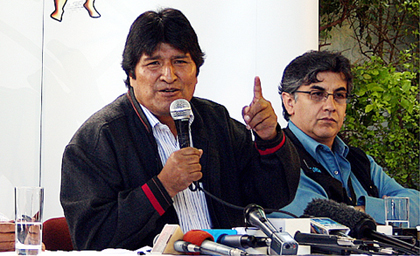„Bolivien hat in den größten Herausforderungen unserer Zeit Führungsstärke gezeigt“, schreibt Pablo Solón, der bis Ende Juni Boliviens UN-Botschafter war, in einem offenen Brief an Evo Morales.
Morales und Solón auf dem Alternativen Klimagipfel von Cochabamba
„Wir dürfen nicht die Rezepte des gescheiterten Entwicklungsdenkens wiederholen, das das Verhältnis der Menschheit zur Mutter Erde bis an eine Bruchstelle gebracht hat“, so Solón weiter. Um die derzeitige Krise zu überwinden, wünscht er sich, dass Morales die Fernstraße um das TIPNIS-Schutzgebiet herum bauen lässt. Die Verantwortlichen für den Polizeieinsatz am letzten Sonntag sollten bestraft werden.
Der Brief schließt mit dem Appell: „Wir müssen einen breiten partizipativen Prozess einleiten, eine landesweite Debatte um eine neue Agenda im Rahmen des Guten Lebens“.
Hier die englische Übersetzung:
President and Brother Evo Morales,
Since 2006, Bolivia has shown leadership to the world on how to tackle the most profound challenges of our time. We have achieved the approval of the Human Right to Water and Sanitation in the United Nations and promoted a vision for society based on Vivir Bien (Living Well) rather than consuming more.
However, there must be coherence between what we do and what we say. One cannot speak of defending Mother Earth and at the same time promote the construction of a road that will harm Mother Earth, doesn’t respect indigenous rights, and violates human rights in an „unforgiveable“ way.
As the country that initiated the International Day of Mother Earth, we have a profound responsibility to be an example on the global stage. We cannot repeat the same recipes of failed „developmentalism“ that has already brought the relationship between humanity and Mother Earth to a breaking point.
It is incomprehensible that we promote a World Conference on Indigenous Peoples at the United Nations in 2014 if we don’t lead the way in applying the principle of „informed, free, and prior consent“ for indigenous peoples in our own country.
The Eighth Indigenous March has some incoherent and incorrect demands such as those related to hydrocarbons and the sale of forest carbon credits that look to commodify Mother Earth (known as REDD). However, their concern about the impacts of the construction of this road is just.
Thousands of the delegates of five continents who participated in the first World People’s Conference on Climate Change and the Rights of Mother Earth are deeply upset by the Bolivian government’s actions.
The conflict in TIPNIS should never have happened. Greater physical integration of the country is necessary, but it does not need to go through the „Isiboro Sécure National Park and Indigenous Territory“ (TIPNIS). Obviously, building a road that doesn’t go trough the park would be more expensive, but trying to save $200 million or $300 million without taking social and environmental costs into account goes against the very principles of the „Living Well.“
In order to stop the manipulation of the Right who wish to use this protest to return to the past, we must be even more consistent in defending human rights, indigenous peoples‘ rights, and the rights of Mother Earth.
It’s not too late to resolve this crisis if we suspend permanently the construction of the road trough the TIPNIS, bring to justice those responsible for the repression of the indigenous march, and open up a broad and participatory national and regional debate to define a new agenda of actions in the framework of the Living Well.
Pablo Solón, 28 September 2011



